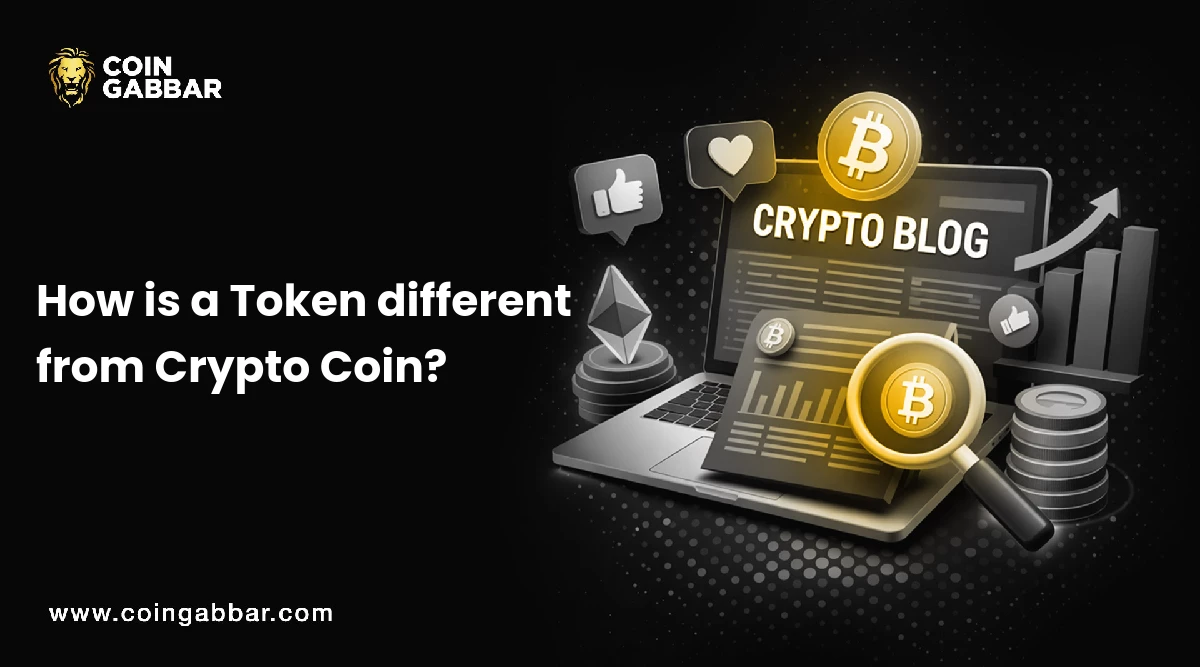
Cryptocurrency tokens and coins are two different forms of digital assets, both having distinct characteristics with varied associated usages. Both are valuable tools in the increasingly popular cryptocurrency industry but serve very different purposes.
What is a crypto token?
A token is a digital representation of value, be it an asset or utility. Although many tokens are based on the Ethereum blockchain, they may also reside on other platforms. They can represent anything from raw materials to currencies to loyalty points and more.
Tokens are used for a variety of purposes such as access control, rewards, or voting in a decentralized system. Tokens are generally created by projects that wish to raise money through token sales, or Initial Coin Offerings (ICOs).
Here are the top tokens you can find on the crypto market:
ERC20 tokens: These tokens are created on the Ethereum blockchain and are compliant with the ERC-20 protocol standard. They offer a wide range of functionalities such as representing digital assets, application access, voting power, or loyalty rewards.
Non-fungible tokens (NFTs): Unlike other crypto tokens, Non-Fungible Tokens are unique and individual tokens that represent real-world assets. They can be used to create digital collectibles, like art, music, or even virtual lands in gaming worlds.
Tether-Tether is a stablecoin that is pegged to the US Dollar. Its purpose is to provide users with a token that will always be worth 1 USD, no matter what happens in the crypto market. This ensures stability and confidence for its holders.
USD Coin-USD Coin (USDC) is a digital dollar issued by the CENTRE Consortium and controlled by Coinbase, offering the same benefits as physical cash. It’s used to facilitate global payments with low fees and can be exchanged for other major crypto assets.
Binance USD-Binance USD (BUSD) is a stablecoin issued by the Paxos Trust Company and regulated by the New York State Department of Financial Services. It was designed to be used for trading and payments, giving users access to secure digital money with low fees.
LEO Token-LEO Token (LEO) is the native token of iFinex, the parent company of Bitfinex. It provides holders with access to exclusive features on their platforms and gives them a share in the platform’s profits.
Shiba Inu-Shiba Inu (SHIB) is a decentralized finance (Defi) token created as a parody of Dogecoin. It’s intended to be used for tipping, rewarding content creators, and other similar purposes.
Lido Staked Ether-Lido Staked Ether (LST) is a token that represents staked Ethereum. It gives holders the ability to earn rewards from their ETH deposits while keeping it liquid and making it easier to use for Defi applications.
FTX Token-FTX Token (FTT) is the native token of the FTX exchange. It gives holders access to discounted trading fees, airdrops, and other benefits on the platform.
Chainlink-Chainlink (LINK) is a decentralized oracle network that connects smart contracts with real-world data. It’s designed to bridge the gap between on-chain and off-chain information, providing reliable inputs for smart contracts.
Tokens are created through the use of smart contracts. Smart contracts are digital agreements that are written in code and stored on a blockchain network. They enable parties to exchange money, property, or anything of value without the need for a middleman or central authority.
When creating a token, developers must first decide what type of token they want to create – such as an ERC-20 token, a Non-Fungible Token (NFT), a stablecoin, or an exchange token. They must also define the features and functionalities of the token – such as how it will be used, who will be able to use it, and what incentives it offers.
Once all of this is set up, developers can then create the smart contract code for the token and deploy it on a blockchain network. This will allow users to access and trade the token, as well as send, receive, and store it in their wallets.
Tokens can be grouped into three categories: security tokens, equity tokens, and utility tokens. Each type of token can be issued to finance a project's development. There are several different types of tokens, each with its own characteristics and use cases. Let's take a closer look at some of the most popular ones.
Security tokens- Security tokens are digital assets that represent ownership of a physical asset or a financial instrument. They enable investors to access more traditional investments and can be used for crowdfunding purposes.
Equity Token- Equity tokens are similar to security tokens in that they represent a form of ownership, but they instead allow investors to own an equity stake in a project or company. They are typically used as a way to raise funds for startups and can provide investors with long-term returns.
Utility Token- Utility tokens are digital assets that have a purpose within an ecosystem. They provide users access to certain features or services, such as discounts on fees or exclusive content. Some utility tokens, such as Ethereum’s Ether (ETH), can also be used to pay for goods and services.
Token standards are guidelines that developers must follow when creating tokens. Token standards provide a universal framework for how tokens should be created and used, allowing them to be easily integrated with other applications and services.
The most popular token standards include ERC-20 (Ethereum Token Standard), ERC-721 (Non-Fungible Token Standard), and BEP-20 (Binance Token Standard). Token standards are an important part of the tokenization process and help ensure that tokens will be compatible with different platforms.
A coin is a cryptocurrency native to the blockchain it runs on. Coins have their own blockchain network and provide users with access to the digital assets stored on them. They are created through mining or staking, and they usually have a specific purpose or utility that makes them valuable.
The following are the top cryptocurrencies that coins:
Bitcoin- Bitcoin is the first and largest cryptocurrency by market capitalization. It was created in as a peer-to-peer digital payments system, and it allows users to store, send, and receive money without the need for a third party.
Ethereum- Ethereum is an open-source platform that enables developers to create decentralized applications (apps) and smart contracts. It has its own cryptocurrency, Ether (ETH), which is used to pay for transactions and fees associated with using the platform.
Ripple- Ripple is a real-time gross settlement system that uses its native cryptocurrency, XRP, to provide fast and secure payments between two parties. The company also provides financial services to businesses, such as money transfers and currency exchanges.
Litecoin- Litecoin is an open-source payment network that uses its own cryptocurrency, LTC. It was created as a fork of Bitcoin and is designed to provide faster transaction times than Bitcoin.
Cardano- Cardano is a blockchain platform that enables developers to create smart contracts and decentralized applications. It also has its own cryptocurrency, ADA, which is used to pay for transactions on the Cardano network.
Tokens and coins are powerful tools for creating novel financial products, facilitating real-time payments, and enabling secure transactions between two parties. As the tokenization movement continues to grow, it is likely that more projects will emerge with their own native tokens and coins. It is important for investors to understand the different types of tokens and coins available so they can make informed decisions on which assets to invest in.
The tokenization of assets is likely to become more widespread as the technology matures, making tokens and coins a valuable long-term investment for those who understand their potential. Operate on their own blockchain, tokens and coins are changing the way we interact with money and enabling us to access new opportunities in an increasingly digital world.
By understanding the different types of tokens and coins, investors can access a wide range of financial opportunities. Operate on their own blockchain, tokens and coins provide users with an alternative to traditional currencies and enable them to participate in projects that are driving innovation around the world.

Rohit Khandelwal is a seasoned English Blog Writer and financial expert contributing to Coin Gabbar, where he writes about cryptocurrency markets, blockchain technology, and global finance trends. As a qualified Chartered Accountant and Company Secretary, he brings in-depth knowledge of financial systems and regulatory frameworks to his writing. Rohit’s content focuses on investment strategies, market insights, and the evolving digital economy, making it valuable for both beginners and seasoned investors. Passionate about continuous learning, he spends his free time traveling, investing, trading, listening to music, and writing, blending practical expertise with creative expression.
2 years ago
thanks for the knowledge

2 years ago
THE COMMUNITY TEAM HIGHLY RECOMMENDS AND VERIFIED MRS KAREN TOMPSOM AS THE ONLY PROFESSIONAL TRADER TO AID YOU IN ALL TRADING RELATED ISSUES,,WRITE TO HER ON INST💹AG*RAM@{KARENTOMPSOM}

2 years ago
Nice projeck

2 years ago
nice

2 years ago
nice projects

2 years ago
seems you know a lot abt creating smart can contract token,so,can you help is there anyway to identify a fake smart contract?

2 years ago
good
